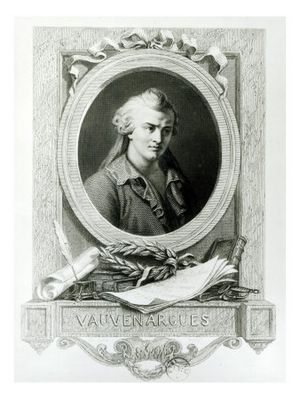Luc de Clapiers, marquis de Vauvenargues facts for kids
Luc de Clapiers, marquis de Vauvenargues (born August 6, 1715 – died May 28, 1747) was a French writer and a "moralist." A moralist is someone who writes about human nature, feelings, and how people should live. He became famous for his wise sayings and thoughts. He sadly died at only 31 years old. He had published a book of essays and wise sayings just one year before, with help from his friend, the famous writer Voltaire. People started to really notice his work after 1797, and his sayings became very popular from 1857 onwards. His friendship with Voltaire, who was 20 years older, is a big part of his story in French literature.
Contents
Early Life and Challenges
Luc de Clapiers was born in Aix-en-Provence, France. His family was part of the nobility, but they were not rich. He spent his childhood at his family's home, the Chateau of Vauvenargues. He had poor health and weak eyesight, which meant he could not go to school much. He did not study Latin or Greek.
Even though he was often sick, he made good friends. He became friends with Victor Riqueti, marquis of Mirabeau. Victor was the father of Mirabeau, who would later become an important figure in the French Revolution. He also befriended Jules-François-Paul Fauris de Saint-Vincens, who later became an archaeologist. Vauvenargues loved writing letters to both of them after he left home.
Military Career and Hardships
In France during his time, noblemen usually chose careers in the military or the church. When he was about 17 or 18, Vauvenargues joined the army. He became a cadet in the King's Regiment. By 1739, he was a lieutenant, and later he was promoted to captain.
In 1740, he met a younger officer named Paul Hippolyte Emmanuel de Seytres. This young man became a very important friend to Vauvenargues. They both took part in the difficult Siege of Prague (1742). This was a military mission in Bohemia where the French army supported Frederick II of Prussia. Sadly, Seytres died during this time at only 17 years old.
Vauvenargues was deeply affected by his friend's death. He wrote a philosophical work called Conseil à un jeune homme (Advice to a Young Man) for Seytres. He also worked on a funeral speech for him, which he considered very important. He kept improving it until his own death.
The Siege of Prague also hurt Vauvenargues's health badly. In December, his legs froze during a strategic retreat. He spent a long time in a hospital in Nancy, but he never fully recovered. He was also at the battle of Dettingen. After returning to France, he was stationed at Arras before he retired from the army.
Friendship with Voltaire and Literary Path
In April 1743, Vauvenargues started writing letters to Voltaire. His friend, the marquis of Mirabeau, encouraged him to become a writer. Vauvenargues wanted to work in diplomacy, which means representing his country in other nations. For two years, he tried to get a job from ministers and even King Louis XV.
He almost got a diplomatic job thanks to Voltaire's help. However, he caught smallpox, a serious disease. It disfigured his face, made him almost blind, and left him with a constant cough. Despite this, Voltaire asked him to share his thoughts on the differences between two famous French playwrights, Jean Racine and Pierre Corneille. Their friendship grew stronger and became very deep.
Life in Paris and Published Works
In 1745, Vauvenargues was able to move to Paris. He lived a quiet life there. He mostly socialized with only a few people, including Jean-François Marmontel and Voltaire. He also continued to write letters to his old friend, Fauris de Saint-Vincens.
In 1746, he published his only book. It was published without his name on it. The book included Introduction à la connaissance de l'esprit humain (Introduction to the Knowledge of the Human Mind), along with Reflexions (Reflections) and Maximes (Maxims). Voltaire urged him to publish a second edition with better writing. This second edition was published in the year he died.
Vauvenargues passed away in Paris on May 28, 1747.
Key Ideas and Writings
As a child, Vauvenargues greatly admired the ancient Greek writer Plutarch. Even though he wrote only a small amount, his work has been very interesting to many people.
About a hundred years after he died, the philosopher Arthur Schopenhauer quoted some of Vauvenargues's sayings. One famous saying is: "la clarté est la bonne foi des philosophes" (clarity is the good faith of philosophers). Another is: "personne n'est sujet a plus de fautes que ceux qui n'agissent que par reflexion" (none are so prone to make mistakes as those who act only on reflection).
Vauvenargues is often compared to an earlier French writer, François de La Rochefoucauld. The main difference is that Vauvenargues had a more positive view of people. He was more like a Stoic, believing in strength and self-control, rather than an Epicurean, who focused on pleasure. He has even been called a modern Stoic.
See also
 In Spanish: Luc de Clapiers para niños
In Spanish: Luc de Clapiers para niños
 | Jewel Prestage |
 | Ella Baker |
 | Fannie Lou Hamer |


